King Constantine II of the Hellenes, a monarch who reigned over Greece from 1964 to 1973, has left an indelible mark on the nation's history. Born in 1940, Constantine was destined to rule, as declared by his father, King George II, in a heartfelt letter that highlighted the immense responsibility and honor that came with the role.
Constantine's early life was marked by tragedy, as he was only six years old when his uncle, King Paul I, succeeded his father. He was educated at various institutions, including the Victoria College of Alexandria, where he befriended King Hussein of Jordan. His marriage to Princess Anne-Marie of Denmark in 1964 solidified his position as the future king. The couple's reign was marked by turmoil, culminating in the abolition of the monarchy in 1974. Despite the challenges, Constantine's legacy continues to be celebrated by the Greek people.
what was the role of king constantine ii of the hellenes during his reign
King Constantine II of the Hellenes played a significant role during his reign from 1964 to 1973. He was the last King of Greece, succeeding his father King Paul I upon his death. Constantine's early life was marked by the tumultuous period of the Greek Civil War, during which his family was forced to leave the country. He spent his early years in exile in Egypt and South Africa before returning to Greece in 1946.
Upon ascending to the throne, Constantine married Princess Anne-Marie of Denmark in 1964, solidifying his position as the future king. His reign was marked by significant political instability, which culminated in the Colonels' Coup of 1967, where the Greek junta seized power. Despite being the head of state, Constantine was unable to effectively counter the military regime due to the lack of loyal military forces.
Constantine's attempts to counter the junta were unsuccessful, and he was eventually forced to leave the country on December 3, 1967. He remained the head of state in exile until the junta abolished the monarchy on June 1, 1973. The subsequent referendum in December 1974, which was held after democracy was restored, further solidified the abolition of the monarchy.
Throughout his reign, Constantine also pursued his passion for sailing, winning a gold medal at the 1960 Rome Olympics. He continued to serve on the International Olympic Committee and was recognized as one of the 1960 Greek Athletes of the Year.
In summary, King Constantine II of the Hellenes played a crucial role during his reign, marked by significant political instability and the eventual abolition of the monarchy. Despite these challenges, he remained committed to his duties as head of state and continued to engage in various pursuits, including his Olympic career.
what were some of the major events that occurred during king constantine ii's reign
During King Constantine II's reign from 1964 to 1973, several significant events took place that shaped the course of Greek history. Some of the major events include:
Colonels' Coup of 1967: The military junta seized power in Greece on April 21, 1967, which led to the suspension of democracy and the establishment of a military dictatorship. King Constantine II was unable to effectively counter the junta due to the lack of loyal military forces.
Forced Exile: Constantine was forced to leave Greece on December 3, 1967, as the junta took control of the government. He remained the head of state in exile until the junta abolished the monarchy on June 1, 1973.
Monarchy Abolition: The military regime abolished the Greek monarchy on June 1, 1973, marking the end of the monarchy in Greece. This decision was ratified by a referendum held on July 29, 1973.
Second Referendum: After democracy was restored in 1974, another referendum was held on December 8, 1974, to confirm the abolition of the monarchy. The result was the same, and the monarchy was officially abolished.
Olympic Career: Constantine was an accomplished sailor and won a gold medal at the 1960 Rome Olympics in the Dragon class. He later served on the International Olympic Committee.
These events, along with his personal life and achievements, defined King Constantine II's reign and its impact on Greece's history.
what were the major political challenges faced by king constantine ii during his reign
King Constantine II of Greece faced significant political challenges during his reign from 1964 to 1973. Some of the major challenges include:
Colonels' Coup of 1967: The military junta seized power in Greece on April 21, 1967, which led to the suspension of democracy and the establishment of a military dictatorship. Constantine was unable to effectively counter the junta due to the lack of loyal military forces.
Forced Exile: Constantine was forced to leave Greece on December 3, 1967, as the junta took control of the government. He remained the head of state in exile until the junta abolished the monarchy on June 1, 1973.
Monarchy Abolition: The military regime abolished the Greek monarchy on June 1, 1973, marking the end of the monarchy in Greece. This decision was ratified by a referendum held on July 29, 1973.
Second Referendum: After democracy was restored in 1974, another referendum was held on December 8, 1974, to confirm the abolition of the monarchy. The result was the same, and the monarchy was officially abolished.
Political Instability: Constantine's reign was marked by significant political instability, which culminated in the Colonels' Coup of 1967. This instability was a result of the ongoing political tensions and divisions in Greece since the end of World War II.
Disagreements with Prime Minister: Constantine had disagreements with Prime Minister George Papandreou, which led to the government's resignation. This was followed by a power vacuum, which ultimately led to the military coup.
Countercoup and Exile: Constantine attempted a countercoup against the junta but was unsuccessful. He was forced into exile, first in Rome and later in London.
These challenges, along with his personal life and achievements, defined King Constantine II's reign and its impact on Greece's history.
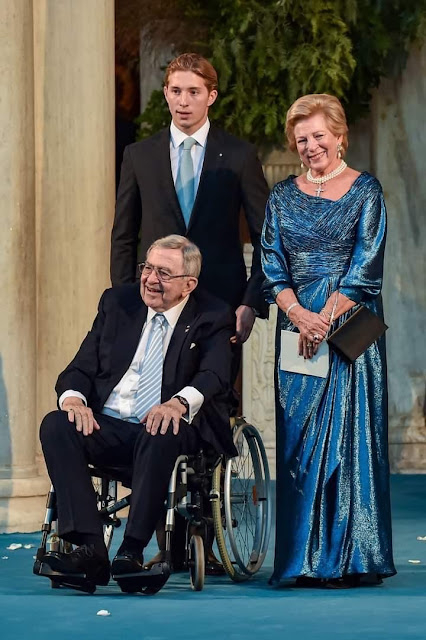 |
| King Constantine and Queen Anne-Marie, with their grandson Constantine, at the wedding of their son Philippos. |
Today, 10 January, King Constantine II of Greece died at Hygeia Hospital in Marousi, a suburb of Athens. The king was eighty-two years-old.
 |
| Crown Prince Pavlos and Crown Princess Frederica with their children Princess Sophia and Prince Constantine. |
 |
| The King and Queen of Greece with their three children. |
Prince Constantine of Greece and Denmark was born at the villa of Psychiko, home of his parents, on 2 June 1940. A 101 gun salute from Mount Lycabettus at 6pm that evening announced to Athens that a new prince had arrived into the world. Crown Princess Frederica recalled: "
My two elder children, Sophie and Constantine, were born in my sitting-room in our small house. My parents came for Sophie's birth but, when Tino was born, the war had already started and they could not come. Palo [Paul] stayed with me all the time and held my hand. The Prime Minister sat downstairs with the King, because it was the custom that the Prime Minister should be in the house." The Acropolis was floodlighted in celebration of the prince's birth, and guns were fired in salute throughout the country. The baby boy was named after his paternal grandfather King Constantine I of Greece; Prince Constantine was christening on 20 July 1940 at the Metropolitan Cathedral. The prince was the first son and second child of Crown Prince Paul of Greece and Crown Princess Frederica (born Princess of Hannover), who wed in 1938. Constantine joined an older sister, Princess Sophia (b.1938); he was followed by a younger sister, Princess Irene (b.1942). At the time of his arrival, Constantine's uncle George II was King of Greece; the infant prince was second in the line of succession after his father Paul.
 |
| The King and Queen of Greece with their children. |
King George II of the Hellenes passed away at Athens on 1 April 1947 at the age of fifty-six. He was succeeded by his last surviving brother, who became King Paul I. At the time, the new Crown Prince Constantine of Greece was only six years-old. The crown prince accompanied his father during the funeral of his uncle. Constantine was educated at a preparatory school and later a boarding school, the Victoria College of Alexandria, Egypt, where his classmates included King Hussein of Jordan. A fellow student recalled him as "
a good chap, a young man with all the right instincts. He was at his best on the playing fields." Constantine was also a pupil at Anavryta, a secondary school established at Sygnros in Kifissia; the prince attended this institution for nine years. Crown Prince Constantine served in all three branches of the Hellenic Armed Forces and attended the requisite military academies. The Greek heir also attended the NATO Air Force Special Weapons School in Germany, as well as the University of Athens, where he undertook courses in the school of law.
 |
| The Greek Royal Family in 1959
Left to right: Crown Prince Constantine, Princess Irene, Queen Frederica, King Paul, Princess Sophia, and Prince Michael.
Photograph (c) Getty Images / Dean Loomis. |
When Crown Prince Constantine came of age in 1958, he swore allegiance to his father and to the Greek people. On the crown prince's eighteenth birthday on 2 June 1958, King Paul delivered this address to his only son:
Constantine,
God has graciously destined you to reign over this glorious, gallant and noble Nation of ours.
This sacred favour given to you, is an outstanding mark of honour and a legacy of great responsibility.
As from this day, you shall be my partner in the endeavour to further the progress and well-being of my people.
I am confident that your love of the Greek People, equal as it is to my own profound affection for them, will bring you as great happiness as it brings to me. In paying the price of their glorious history and enduring the consequences of their age-long struggles even to this day, in defence of mankind, the Greek People have not as yet been able to develop their capabilities to the full and achieve the standard of well-being to which they are justly entitled. For this very reason, they deserve every mark of affection and regard and every act of sacrifice on your part.
Be a just, kind and indefatigable worker for the advance and glory of Greece.
Uphold steadfastly the Democratic Principles of our institutions and the Constitutional Liberties of our People.
Devote your life to the happiness of the Country. There is no task more noble and more important than this. Always remember that it is preferable that the King should suffer than that the suffering should fall on the Nation and the Country. Endeavour to show yourself worthy of the Greek Soldier whose leader you will be in the future. When the time comes, you will take your place at the head of the Greek Armed Forces, the bearers of a heroic and glorious tradition.
Keep them devoted to duty and battle-worthy, the guardians of our tradition, respected by our friends and feared by our foes, the priceless jewel of a proud Nation.
May they never be forced to strike.
Be the protector and guardian of our Holy Church.
Draw your strength from the love between you and your people.
Redress offence by pardon,
Discord by unity,
Error by truth,
Doubt by faith.
I pray that you and my People may know days of glory in the noble struggle for progress and civilisation.
May God Almighty make you an instrument of peace and always keep guard over Greece and over your, Constantine, my son.
In 1959, at the age of nineteen, Constantine met his future wife, his third cousin Princess Anne-Marie of Denmark, aged thirteen, on a visit to Denmark. Anne-Marie was the third and last daughter of King Frederik IX of Denmark and Queen Ingrid. Constantine and Anne-Marie met a second time in Denmark in 1961, when Constantine declared to her parents his intention to marry Anne-Marie; at this point King Frederik briefly locked Constantine in the toilet. They met again in Athens in May 1962 at the marriage of Constantine's sister Princess Sofia of Greece and Denmark to Prince Juan Carlos of Spain at which Anne-Marie was a bridesmaid: and again in 1963 at the centenary celebrations of the Greek monarchy.
 |
| Crown Prince Constantine. |
When he was on a tour of the United States, Constantine spent time with his cousin King Simeon II of Bulgaria, who at that time was a student at the military school at Valley Forge. The two royals were pulled over by a policeman. Though neither Constantine nor Simeon had identification on them, they presented themselves as "Crown Prince of Greece" and "King of Bulgaria." Needless to say, they were briefly arrested before the Greek embassy intervened and verified their identities. In 1960, aged twenty, Crown Prince Constantine won an Olympic gold medal in sailing, which was the first Greek gold medal in sailing since the Stockholm 1912 Summer Olympics. He was also a strong swimmer and had a black belt in karate.
 |
| King Constantine II of Greece with Queen Mother Frederica at the funeral of King Paul.
Pictured behind them is Princess Irene.
Photograph (c) Getty Images / Jack Garofalo. |
 |
| King Constantine II of Greece with his mother Queen Frederica at the funeral of King Paul.
Photograph (c) Getty Images / Keystone. |
Aged sixty-two, King Paul I of Greece died at Athens on 6 March 1964, and Constantine succeeded to the throne. In his biography of the new king, entitled
HM Konstantine XIII, G. Nicholas Tantzos presented Constantine's daily routine once he became monarch: "
The King's average day commenced about 7:30 AM with a breakfast of coffee, boiled eggs and toast, after which he read the newspapers and smoked his first cigarette. Unless there were formal meetings, the King dressed casually in slacks and sweater. By 9 AM he commenced conferences with his staff, going over state papers, and holding audiences, and attending meetings. Lunch was scheduled for 1:30 PM, but the King was usually late. In the afternoon he sometimes played squash with the Assistant Military Attache from the American Embassy, then returned to his office. There were many royal duties: opening factories, trade fairs, presiding over international functions and charitable institutions, reviewing military parades and such. His day usually ended after 9:30 PM in the evening, when he returned to the Palace. Sometimes he listened to music or watched a movie in the Palace basement, or had friends around for drinks."
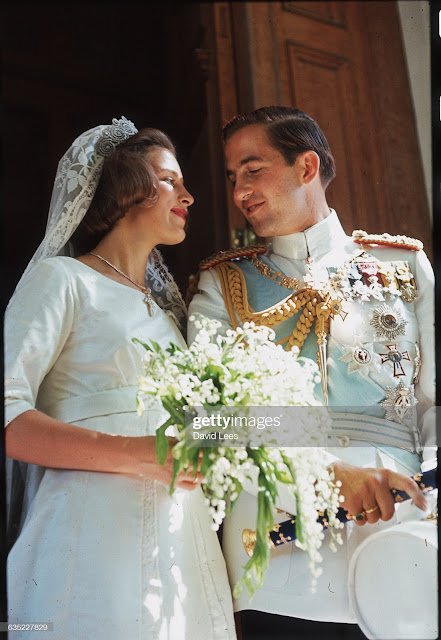 |
| King Constantine and Queen Anne-Marie of Greece on their wedding day, 1964.
Photo (c) Getty Images / David Lees. |
On 18 September 1964, King Constantine II of Greece and Princess Anne-Marie of Denmark were wed at the Metropolitan Cathedral in Athens. In 1967, following political instability, the King and Queen, with their two eldest children, fled from Greece to Rome, where they lived for a time. In 1974, the Greek monarchy was abolished. In 1980, Constantine and Anne-Marie established the Hellenic College of London, where their children were educated in Greek and English.
 |
| King Constantine and Queen Anne-Marie, holding the infant Princess Alexia, are surrounded by Princess Margrethe of Denmark, King Frederik IX and Queen Ingrid of Denmark, Queen Mother Frederica of Greece, and Princess Irene, 1965.
Photo (c) Getty Images / Keystone. |
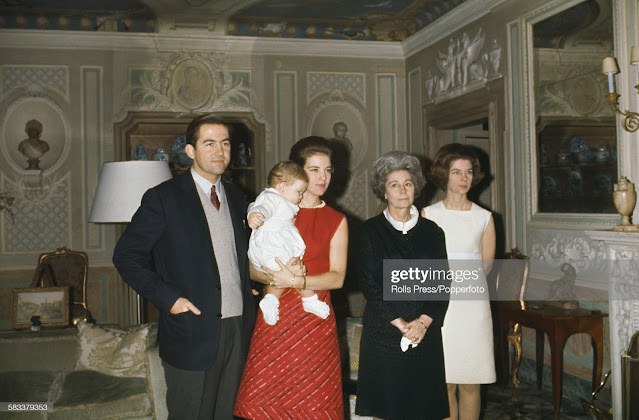 |
| King Constantine, Queen Anne-Marie holding Crown Prince Pavlos, Queen Mother Frederica, and Princess Irene of Greece photographed in Rome, 1967.
Photo (c) Rolls Press / Popperfoto. |
 |
| King Constantine holding Prince Nikolaos and Queen Anne-Marie in Rome, 1969.
Photo (c) Getty Images / Rolls Press / Popperfoto. |
 |
| King Constantine and Queen Anne-Marie, holding Princess Theodora, on the occasion of the christening of the princess. The couple are shown with their children Crown Prince Pavlos and Princess Alexia as well as Queen Elizabeth II, 1983.
Photo (c) Getty Images / Hutton Archive. |
 |
| King Constantine and Queen Anne-Marie, holding Prince Philippos, at the prince's christening in 1986. They are shown with Diana, Princess of Wales, King Juan Carlos and Queen Sofía of Spain, and the Duke of Edinburgh.
Photo (c) Getty Images / Tim Graham.
|
The King and Queen had five children: Princess Alexia (b.1965), Crown Prince Pavlos (b.1967), Prince Nikolaos (b.1969), Princess Theodora (b.1983), and Prince Philippos (b.1986). In 1995, Crown Prince Pavlos married Marie-Chantal Miller; the couple have five children: Princess Maria-Olympia, Prince Constantine-Alexois, Prince Achileas-Andreas, Prince Odyseus Kimon, and Prince Aristidis-Stavros. In 1999, Princess Alexia married Carlos Morales y Quintana; the couple have four children: Arrietta Morales y de Grecia, Anna Maria Morales y de Grecia, Carlos Morales y de Grecia, and Amelia Morales y de Grecia. In 2010, Prince Nikolaos married Tatiana Blatnik. In 2020/2021, Prince Philippos married Nina Flohr. Princess Theodora is engaged to Matthew Kumar.
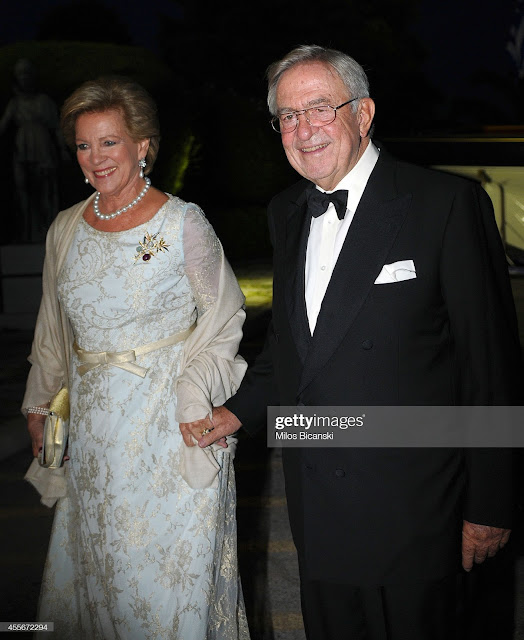 |
| King Constantine and Queen Anne-Marie celebrate their Golden Wedding anniversary, 2014.
Photo (c) Getty Images / Milos Bicanski. |
In 2013, King Constantine and Queen Anne-Marie returned to live in Greece. They made their home at Porto Heli; they moved to Athens in recent years. The king suffered a stroke in 2018. In December 2021, he was admitted to an Athens hospital for treatment of pneumonia and subsequent pulmonary edema caused by aspiration. In January 2022, the king spent several days in hospital after contracting the coronavirus.
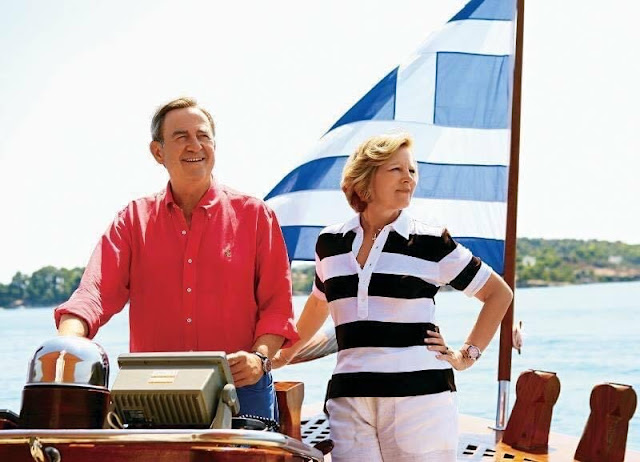
May His Majesty Rest in Peace.
As we conclude our exploration of the life and legacy of King Constantine II of the Hellenes, we are reminded of the profound impact he had on the nation and the world. From his early years in exile to his eventual reign as the last King of Greece, Constantine's life was marked by significant events that shaped the course of history. His dedication to the Greek people, his love of sailing, and his commitment to the Olympic Movement are just a few examples of the many facets that made him a remarkable individual. As we reflect on his life, we are reminded of the enduring legacy of King Constantine II, a legacy that continues to inspire and influence generations to come.
As we bid farewell to this remarkable individual, we are left with a sense of gratitude for the opportunity to learn about his life and achievements. King Constantine II's story serves as a testament to the power of perseverance, dedication, and passion. His unwavering commitment to the Greek people and his love of sailing are just a few examples of the many ways in which he left an indelible mark on the world. As we move forward, we are reminded of the importance of honoring the legacies of those who have come before us, and of continuing to strive for greatness in our own lives. May the memory of King Constantine II of the Hellenes continue to inspire and motivate us to reach for the stars, just as he did throughout his remarkable life.
what were the major accomplishments of king constantine ii during his reign
King Constantine II of Greece, who reigned from 1964 to 1973, achieved several significant accomplishments during his time as the head of state. Some of the major accomplishments include:
Olympic Career: Constantine was an accomplished sailor and won a gold medal at the 1960 Rome Olympics in the Dragon class. He later served on the International Olympic Committee and was named one of the 1960 Greek Athletes of the Year.
Sailing and World Sailing: Constantine was a lifelong and dedicated sailor, serving on the World Sailing Committee and holding various positions within the organization. He was awarded the Beppe Croce Trophy in 2010 for his outstanding voluntary contributions to the sport of sailing.
Establishment of Hellenic College of London: Constantine and his wife, Queen Anne-Marie, established the Hellenic College of London in 1980, where their children were educated in Greek and English.
Support for the Olympic Movement: Constantine became president of the Hellenic Olympic Committee in 1957 and was elected as a member of the International Olympic Committee in 1963. He was actively involved in all aspects of the Olympic Movement and was elected an Honorary Member for life in 1974.
Legacy in Sailing and Sports: Constantine's love for sailing and his contributions to the sport have left a lasting legacy. He is remembered as a dedicated sailor and a strong supporter of the Olympic Movement.
These accomplishments demonstrate King Constantine II's dedication to his country, his love for sailing, and his commitment to the Olympic Movement, which have all contributed to his enduring legacy.






















No comments:
Post a Comment